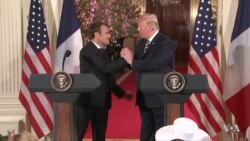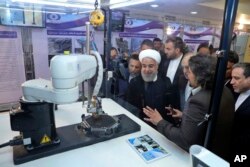European officials are saying they expect President Donald Trump on Tuesday to withdraw the U.S. from the 2015 international agreement to restrain Iran's nuclear weapons development, endangering the accord.
Trump is set to announce his decision at 1800 GMT whether he will continue to waive economic sanctions against Tehran, part of the deal he vowed to abrogate during his successful 2016 run for the White House even as European allies in recent days have implored him to not abandon it.
But European diplomats who have met with top U.S. officials in Washington in recent days say they believe there is little chance that Trump will keep the agreement intact.
Hours ahead of his announcement, Trump for the second consecutive day assailed former U.S. secretary of state John Kerry, one of the chief architects of the agreement between Iran and six international powers — China, Russia, Britain, France, Germany and the U.S. Kerry has met with Iranian Foreign Minister Javad Zarif in an effort to save the pact championed by former U.S. president Barack Obama.
"John Kerry can’t get over the fact that he had his chance and blew it!" Trump said on Twitter. "Stay away from negotiations John, you are hurting your country!"
A day earlier, Trump said, "The United States does not need John Kerry’s possibly illegal Shadow Diplomacy on the very badly negotiated Iran Deal. He was the one that created this MESS in the first place!"
It is uncertain what happens to the Iran accord if Trump follows through on his threat to withdraw the U.S.
The International Atomic Energy Agency has certified 10 times that Iran is complying with the deal. The European Commission said Tuesday that "the agreement is working and our commitment to continue with implementation remains."
WATCH: Trump's upcoming decision
‘Badly negotiated’
But Trump has said the pact is deeply flawed since it does not address Iranian ballistic missile tests or Tehran's military advances in Syria, Yemen and elsewhere in the Middle East.
Iran has threatened to withdraw from the agreement if the U.S. does, but Iranian President Hassan Rouhani took a more measured stance Tuesday in advance of Trump's statement. He said Iran would continue its "engagement with the world."
Rouhani said that if the U.S. does not waive sanctions, "It is possible that we will face some problems for two or three months, but we will pass through this."
Under one scenario, Trump could reimpose sanctions on Iran's central bank, but allow those doing business with Iran a six-month grace period to wind down their business activities.
That could allow world powers and Iran a chance to negotiate further restrictions on Iran's nuclear program, missile tests or military activity in the Middle East, although Tehran has given no indication it is willing to resume talks.
The three-year-old agreement called for lifting sanctions on Iran that had hobbled its economy in exchange for Iran restraining its nuclear program, which Iran has claimed was for peaceful purposes. Israeli Prime Minister Benjamin Netanyahu has long criticized the deal and in Trump has found an ally with similar views.
The U.S. leader has long been critical of the agreement, saying Monday that it was "very badly negotiated." Among his chief objections are a lack of provisions addressing Iran's ballistic missile activity and the fact that Iran's responsibilities, such as limiting its uranium enrichment, expire after a set number of years.
The text of the document, formally known as the Joint Comprehensive Plan of Action, states in multiple places that Iran would treat the reinstatement of sanctions "as grounds to cease performing its commitments" to restrain nuclear development in whole or in part.
In recent weeks European allies have been lobbying Trump to keep the existing deal in place while signaling a willingness to address ballistic missiles and Iran's actions in the Middle East through supplemental negotiations.
"We think we'll be tougher on Iran but not throw away that the heart of the deal, which is all about stopping them getting a nuclear weapon," British Foreign Secretary Boris Johnson said Monday in Washington, where he met with Vice President Mike Pence and Secretary of State Mike Pompeo.
Johnson said it is clear Iran will not want to renegotiate the 2015 pact.
French President Emmanuel Macron said during his own visit last month that while no agreement is perfect, there is no alternative strategy for the Iran nuclear deal.







